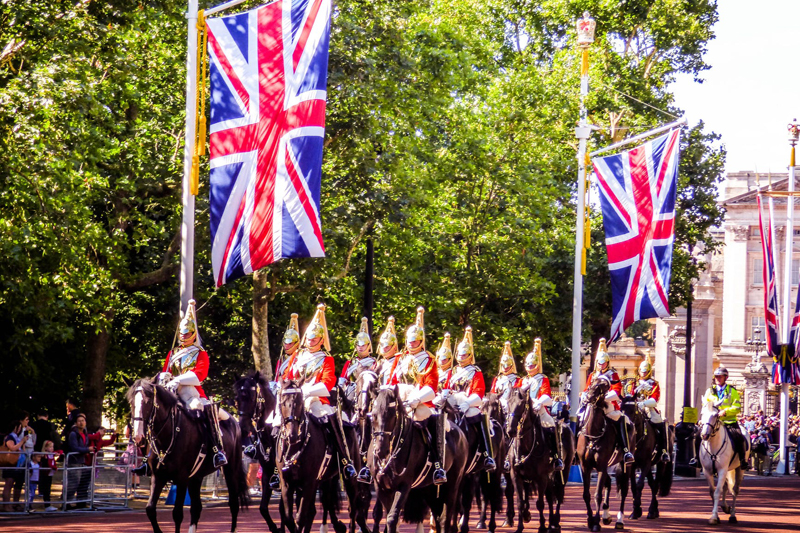Fast Facts About England

Location
England’s back – her east coast - is toward mainland Europe. London, England’s capital city, is in south-east England with excellent transport links to the continent.
France is to the south of England, the countries separated by the English Channel which embraces the Channel Islands including Guernsey, Jersey, Alderney, Herm and Sark. The English Channel is also home to the Isle of Wight – the biggest English island - which nestles comfortably below Hampshire. Beyond Land’s End in Cornwall are the Scilly Isles, blessed with a temperate climate.
England is bordered by Wales to her west, and she gazes past Wales across the Irish Sea - wherein lies the Isle of Man - to Ireland.
On England’s northern border you will find Scotland, and beyond Scotland the North Sea, Orkney and the Shetland Islands.
Flag
The English flag is the Flag of St George – red cross on a white background. This symbol has sometimes been associated with extreme nationalism, and as such is not always seen as a positive image.
The United Kingdom’s flag is the Union Jack – red, white and blue. It incorporates the red - horizontal and vertical - cross of St George (England), the red cross of St Patrick (Ireland) and the white on blue background cross of St Andrew (Scotland).
National Anthem
God save our gracious Queen
Long live our noble Queen
God save the Queen.
Send her victorious
Happy and glorious
Long to reign over us
God save the Queen.
God Save The King/Queen (depending on the sex of the monarch) is the National Anthem for the United Kingdom which consists of England, Northern Ireland, Scotland and Wales. The anthem is also used in many Commonwealth countries.
It has been suggested that Jerusalem - words by William Blake, music by Hubert Parry, would be a fitting and suitable national anthem for England. It is a rousing song, frequently heard at political conferences and sporting events.
Patron Saint
England’s patron saint is St George and St George’s Day takes place on 23 April (which is also the date that Shakespeare died).
Monarchy
Offa, King of Mercia in the eighth century, overtook many kingdoms and married his daughters to the Kings of Wessex and Northumbria. He built Offa’s Dyke to separate Mercia and Wales, and has been called the first English king.
2011 heralded a change in the rules of succession to the British throne, when it was agreed that the heir to the throne should be the first child of the monarch. Previously the heir had been the first boy child; Elizabeth II only gained the throne because she had no brothers.
England’s back – her east coast - is toward mainland Europe. London, England’s capital city, is in south-east England with excellent transport links to the continent.
France is to the south of England, the countries separated by the English Channel which embraces the Channel Islands including Guernsey, Jersey, Alderney, Herm and Sark. The English Channel is also home to the Isle of Wight – the biggest English island - which nestles comfortably below Hampshire. Beyond Land’s End in Cornwall are the Scilly Isles, blessed with a temperate climate.
England is bordered by Wales to her west, and she gazes past Wales across the Irish Sea - wherein lies the Isle of Man - to Ireland.
On England’s northern border you will find Scotland, and beyond Scotland the North Sea, Orkney and the Shetland Islands.
Flag
The English flag is the Flag of St George – red cross on a white background. This symbol has sometimes been associated with extreme nationalism, and as such is not always seen as a positive image.
The United Kingdom’s flag is the Union Jack – red, white and blue. It incorporates the red - horizontal and vertical - cross of St George (England), the red cross of St Patrick (Ireland) and the white on blue background cross of St Andrew (Scotland).
National Anthem
God save our gracious Queen
Long live our noble Queen
God save the Queen.
Send her victorious
Happy and glorious
Long to reign over us
God save the Queen.
God Save The King/Queen (depending on the sex of the monarch) is the National Anthem for the United Kingdom which consists of England, Northern Ireland, Scotland and Wales. The anthem is also used in many Commonwealth countries.
It has been suggested that Jerusalem - words by William Blake, music by Hubert Parry, would be a fitting and suitable national anthem for England. It is a rousing song, frequently heard at political conferences and sporting events.
Patron Saint
England’s patron saint is St George and St George’s Day takes place on 23 April (which is also the date that Shakespeare died).
Monarchy
Offa, King of Mercia in the eighth century, overtook many kingdoms and married his daughters to the Kings of Wessex and Northumbria. He built Offa’s Dyke to separate Mercia and Wales, and has been called the first English king.
2011 heralded a change in the rules of succession to the British throne, when it was agreed that the heir to the throne should be the first child of the monarch. Previously the heir had been the first boy child; Elizabeth II only gained the throne because she had no brothers.
You Should Also Read:
St George's Day
Jerusalem by William Blake
The Royal Wedding William and Kate

Related Articles
Editor's Picks Articles
Top Ten Articles
Previous Features
Site Map
Content copyright © 2023 by Asha Sahni. All rights reserved.
This content was written by Asha Sahni. If you wish to use this content in any manner, you need written permission. Contact Sarah V Monaghan for details.


